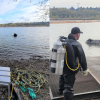All letters to the editor published by KelownaNow reflect only the opinions of the readers who write them, and not necessarily those of KelownaNow or its staff.

When Prime Minister Justin Trudeau came to Vancouver recently to meet with first responders and health-care workers to tell them that the entire country must work together to solve the opioid crisis, the doorway to healing and recovery was opened a little wider.
Recognizing that the problem is not isolated to Vancouver’s Downtown Eastside or major urban centres is a big step in solving this national crisis. At the time of Trudeau’s round-table meeting and conference, he told listeners, “This is a crisis that seems, for most Canadians, to be very far away. Something that’s limited to certain tougher parts of town, to the West Coast, but we are seeing a spread of opioids across the country and we’re seeing it spread far and wide across socio-economic levels, across communities. We need to come together as a country to help our most vulnerable.”
Most importantly, Prime Minister Trudeau made a clear statement that to solve this crisis we must go far beyond “band aid solutions” and focus on long-term strategies. With this recognition comes a need for work to begin in earnest. A long-term solution that includes as an absolutely key focus on recovery and not just short-term fixes is what is ultimately required to solve this crisis of epidemic proportions.
The strategy of harm-reduction addresses some of the immediate problems our first responders, friends and family members are experiencing and seeing first-hand play out on our streets. Harm-reduction can be a necessary first step toward establishing a long-term answer. We must all look to how we can build upon public health approaches so as to be able to best help people out of a life of addiction.
If we’ve learned anything from the opioid overdose crisis in BC, it is that when harm reduction is relied upon without the additional tools, this strategy does not address the whole picture or even perhaps the most important aspect of a long-term solution, which is ensuring that those suffering from addiction have access to evidence-based treatment programs and facilities that offer the kind of psychological and emotional support that addicted persons have shown can be absolutely critical for recovery.
We cannot lose sight of the fact addiction is an illness that requires a broad evidence-based response. The National Institute on Drug Abuse tells us addiction changes the brain in fundamental ways that results in normal needs and desires being replaced with compulsive behaviours, which override the ability to control what can be dangerous impulses. You would not expect someone suffering from a mental illness to get control of his or her life without any professional intervention, so why would we expect a drug addicted person to recover without the same access to evidence-based and recovery-focused medical assistance?
There is much more that we can and must do to build a long-term approach to this crisis. It can start with reducing the stigma of recovery in our families and workplaces and advocating for better services, health assessments and referrals for people with addiction. We need committed funding and a comprehensive recovery presence for First Nations, the LGBTQ communities, in rural communities, sub-urban neighbourhoods and workplaces.
Alongside the public health and acute addiction treatment services that must be established, we also need comprehensive recovery services. This should include the establishment of recovery community centres across BC and collegiate recovery programs on our university and college campuses. We need to advocate for and establish BC’s first recovery high school as has been done in other jurisdictions.
We need to promote recovery management check-ups amongst our medical community and support research of recovery focused facilities and best practices.
Every Mayor in this province should have a recovery working group, made up of people in recovery, to measure and build their community’s recovery capital and resilience to addiction.
Finally, we should openly celebrate recovery with a provincial “Recovery Week” to recognize success and reduce stigma.
Not until we begin to take a long-term, multi-levelled, recovery-focused approach that ensures our population has immediate access to treatment and rehabilitation facilities and services, will we be able to resolve this growing addiction crisis.
By Marshall Smith,
Chair of the BC Recovery Council
















